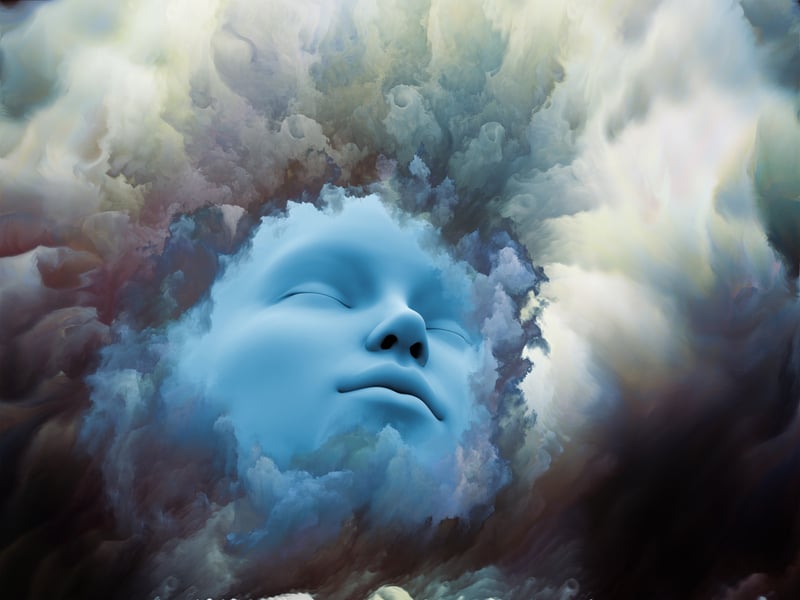What Are Vivid Dreams & What Causes Them?

Standard dreams, vivid dreams, nightmares, and more… dreams are a fascinating and largely unknown territory, much like the blackholes of the sky or the extreme depths of the ocean. There are myriad theories as to why we dream and what dreams mean, but nobody really definitively knows.
Some dreams are especially poignant and tend to be in vivid color, with big emotional impact. These are known as “vivid dreams” and are an interesting part of the dream portfolio.
What are Dreams?
We all dream. Whether you’re awake or asleep, dreaming happens as your brain sifts through various feelings, experiences, images, sounds, smells, emotions, and more. Dreaming is not something that is controllable, which makes it all the more both frustrating and fascinating.
Dreams typically happen during one of two sleep cycles: REM sleep (rapid eye movement during deep sleep) or non-REM sleep. When you have vivid dreams, they likely occur during the deeper parts of REM sleep and often closer to morning.
Dreams can be in color or in black and white. They usually involve you, acting as yourself, and may include other people you know. They often revolve around tasks or experiences from your life, but more often than not, they seem to make no sense whatsoever.
According to the National Institute of Neurological Disorders and Strokes (NINDS), we can spend up to two hours per night dreaming. Sometimes the content of your dreams will fade as you move into consciousness, but other times, your dreams remain ultra vivid and realistic. Let’s explore the realm of dreams.
Are Vivid Dreams Different from Other Dreams?
How are vivid dreams different from other forms of dreaming? They are simply much more intense, often stressful, and possibly negative. Plus, they’re more likely to be remembered well after waking. Vivid dreams are extremely detailed and usually in full color with all five senses engaged. They can be emotionally draining as they carry over into wakefulness and feel like something you actually experienced.
While vivid dreams can be scary and even tiring, all dreams are not equal. In fact, dreams can vary wildly from person to person, night to night, or dream to dream. Yes, there are many different types of dreams, and they all have unique characteristics.
Regular dreams—these dreams represent the mundane and easily fade when you wake. You don’t have any intense emotions around these dreams, and the longer you’re awake, the less you remember, if you remember any of the dream at all. There is usually no emotional impact or any great thought behind these dreams.
Vivid dreaming—these very real, emotionally-charged dreams can linger in your mind as you move through your day. They are typically brought on by some form of stress, whether physical (like a fever) or psychological (such as stress, PTSD, anxiety, fear, or depression), or even pregnancy. Especially realistic, these powerful dreams are very clear and contain a lot of details. You may even wake up exhausted as these dreams are perceived and remembered almost like a real-life experience.
Lucid dreaming—in these dreams, you consciously realize while you’re dreaming that you’re in a dream. Some people can even bend the events within the dream to their liking, whereas others may simply be aware that they are in a dream state.
Nightmares—these can happen if you’ve experienced a stressful event or if you watch intense or scary movies or read frightening books too close to bedtime. But, there’s not always a rhyme or reason to nightmares. Often, they involve themes of being chased, falling, or being on the brink of death. If nightmares are recurring, your brain may be trying to work through a past trauma, and it could be helpful to seek therapy.
Night terrors—these occur more often in children and involve a scary sequence of events that is soon forgotten upon waking. Although you may wake screaming or flailing, the images produced by night terrors tend to fade quickly, leaving no lasting impression.
False awakening—this is when you dream that you are getting up and moving around. For example, you may dream that you got up and went to the restroom, or you’re awake and fixing a cup of coffee, when in fact, you’re still asleep.
Daydreams—we all tend to daydream now and then, and it’s usually about things that are happening in our lives or projected imagery of things we would like to have happen in the future. It’s usually a pleasant stream-of-consciousness experience.
Recurring dreams—dreams can even have recurring subject matter that seems to crop up over and over again. Some folks may have other subject matter they dream about repeatedly, such as previous experiences or stressful situations.
Why Do We Have Vivid Dreams?
seems to boil down to these likely reasons:
- Poor sleep quality—if you find yourself hovering on the edge of wakefulness or if you don’t get the needed uninterrupted sleep, and you’re constantly up and down and tossing and turning, you’re also more likely to experience vivid dreams once you do finally fall asleep.
- Lack of sleep—even getting too little sleep can cause you to have intense dreams while sleeping. Sleep deprivation can mean the next time you do get to sleep, you may sleep more deeply. More time in REM can mean a greater chance of extreme dreaming.
- Stress—going through stressful times, depression, or anxiety during the day can carry over into your nighttime musings. When your brain is trying to work through problems, it may not just “shut off” when you leave work or lie down at night.
- Medications—meds can have various side effects, including vivid dreaming. Check with your doctor about alternative medications, dosages, and perhaps timing if you are bothered by regular unpleasant or vivid dreams.
Dreaming in and of itself is not a bad thing. But if you find your vivid dreams affecting you negatively, you might want to work on creating a better sleeping environment for yourself. A cold, dark room with little noise is ideal. Also, consider winding down each night before bed. Shut off electronics and stop eating several hours before it’s time to hit the sack to improve quality of sleep.
Once you learn to relax your mind and create a great sleeping routine for yourself, you’ll likely be on your way to happier, less intense or stressful dreams. Sweet dreams, indeed.




 US Doctor: "Eating This Every Day Can Snap You Into Ketosis"
US Doctor: "Eating This Every Day Can Snap You Into Ketosis" 3 Key Nutrients to Help Lubricate Your "Tin Man" Joints
3 Key Nutrients to Help Lubricate Your "Tin Man" Joints AVOID Plant-Based Protein Powders (unless...)
AVOID Plant-Based Protein Powders (unless...)

